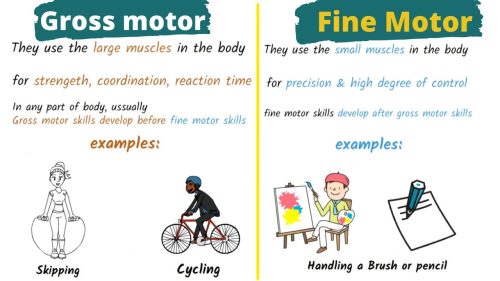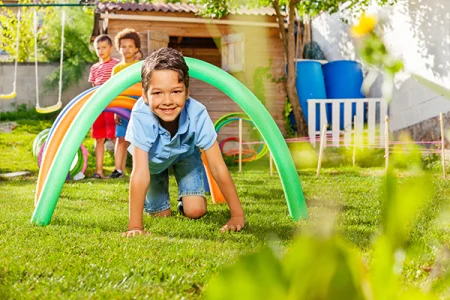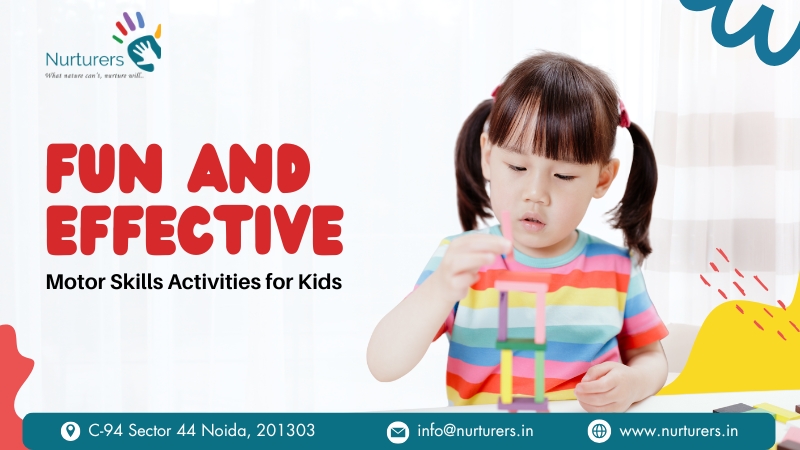Fun and Effective Motor Skills Activities for Kids” delves into exciting and educational ways to help children build essential movement skills through play. Developing motor skills is a key part of early childhood growth, influencing everything from physical strength and coordination to focus and confidence. This blog explains the difference between fine motor skills activities—which involve small muscle movements like cutting, drawing, or buttoning—and gross motor skills activities, which focus on larger movements such as running, climbing, and balancing.
By introducing fun, hands-on motor skills activities for preschoolers, parents and educators can make learning feel like playtime while fostering crucial developmental milestones. From art and craft projects that refine fine motor skills for preschoolers to outdoor games and obstacle courses that enhance gross motor skills, each activity is designed to improve balance, flexibility, and body awareness.
Understanding Motor Skills Development
Motor skills refer to the ability to make controlled movements using muscles and the nervous system. They are divided into two key categories:
1. Fine Motor Skills
Fine motor skills involve small, precise movements using the fingers, hands, and wrists. These are crucial for tasks like writing, drawing, tying shoelaces, buttoning clothes, or picking up small objects.
Examples: coloring, cutting with scissors, or stacking blocks.
2. Gross Motor Skills
Gross motor skills involve larger body movements using the arms, legs, and torso. These help children with walking, running, climbing, throwing, or balancing.
Examples: jumping jacks, riding a tricycle, or catching a ball.
Both skill sets are essential because they form the foundation for a child’s independence and cognitive development. Through motor skills activities, children learn coordination, spatial awareness, and problem-solving—all while having fun.

Why Motor Skills Are Important for Children?
Strong motor skills support nearly every aspect of a child’s growth. Here’s why they matter so much:
- Physical Development: Improves strength, posture, and flexibility.
- Cognitive Development: Boosts focus, concentration, and problem-solving skills.
- Social Skills: Encourages participation in games and group play.
- Self-Esteem: Children gain confidence as they master new tasks.
- Academic Readiness: Good motor control supports handwriting, drawing, and classroom activities.
At Nurturers, our therapists integrate play-based learning to ensure that children develop these skills naturally through exploration, joy, and creativity.
Fun and Engaging Fine Motor Skills Activities for Kids
Fine motor development is all about precision and control. These fine motor skills activities strengthen hand-eye coordination and muscle tone while encouraging focus and creativity.
1. Playdough Sculpting
Rolling, squishing, and shaping playdough builds strong finger muscles. Add tools like plastic knives, stamps, or cookie cutters for more fun challenges.
2. Bead Threading and Lacing Cards
Using beads or pasta for threading helps children improve grip and coordination. It’s an enjoyable fine motor skills activity for preschoolers that also boosts patience and attention to detail.
3. Buttoning, Zipping, and Snapping Practice
Give your child an old shirt or jacket and let them practice buttoning or zipping. These activities for developing motor skills build independence in daily tasks.
4. Paper Tearing and Collage Making
Tearing colored paper into small pieces and gluing them onto a sheet enhances dexterity and control while letting creativity shine.
5. Tweezer Pick-Up Game
Provide tweezers and small items like pom-poms or buttons. Have your child transfer them from one bowl to another — this strengthens finger muscles and focus.
6. Tracing and Coloring Activities
Tracing letters or shapes helps refine pencil control. These are simple yet effective fine motor skills activities for preschoolers to prepare for writing readiness.

Exciting Gross Motor Skills Activities for Kids
Gross motor development focuses on large movements, helping children improve balance, agility, and strength. These gross motor skills activities can be practiced indoors or outdoors and are perfect for burning energy in a healthy way.
1. Obstacle Course Adventure
Create an obstacle course using pillows, chairs, ropes, or tunnels. Let kids crawl, jump, and climb through it. It strengthens large muscles and encourages problem-solving.
2. Balloon Volleyball
Blow up a balloon and toss it back and forth. This simple game promotes hand-eye coordination and reaction time while ensuring lots of laughter.
3. Animal Walk Challenge
Ask your child to move like different animals — hop like a frog, crawl like a bear, or walk like a crab. It improves strength, flexibility, and balance.
4. Balance Beam Fun
Use a strip of tape on the floor or a low wooden beam. Ask your child to walk along it to improve focus and balance control.
5. Dance and Freeze Game
Play music and encourage dancing, but freeze when the music stops. This motor skills activity builds rhythm, timing, and self-control.
6. Catch and Throw Games
Use soft balls or bean bags for catching and throwing practice. It strengthens arm muscles and improves coordination.
Combined Motor Skills Activities for Preschoolers
For preschoolers, it’s beneficial to combine fine motor skills activities for preschoolers and gross motor skills activities for overall development. The right mix ensures that children strengthen both small and large muscles simultaneously. Try these engaging motor skills activities for preschoolers at home or school:
- Sorting Objects While Standing on One Foot: Encourages balance (gross) and precision (fine).
- Building Towers with Blocks: Develops grip strength and spatial awareness.
- Hopscotch with Bean Bags: Improves coordination and number recognition.
- Scooping and Pouring Water: Teaches hand control and sensory awareness.
Drawing on Vertical Surfaces: Use chalkboards or easels to engage both arm and wrist muscles.
Tips for Parents to Encourage Motor Skill Development
Parents play a key role in building motor strength. You don’t need fancy equipment — just creativity, patience, and consistency. Here’s how you can encourage activities for developing motor skills at home:
- Limit screen time and increase active play.
- Create daily play routines involving climbing, coloring, and dancing.
- Involve kids in daily chores, such as folding clothes, stirring batter, or watering plants.
- Encourage outdoor play — cycling, running, or gardening all promote movement.
- Use sensory play materials, like sand, clay, and water for hands-on exploration.
Remember: regular repetition of motor skills activities strengthens neural connections and leads to steady improvement in coordination and control.
How Nurturers Helps in Motor Skill Development?
At Nurturers, we understand that every child is unique. Our expert therapists design individualized programs that focus on enhancing both fine and gross motor skills through structured play, sensory integration, and therapy-based activities.
Our sessions include:
- Guided fine motor skill activities like pegboards, puzzles, and tracing.
- Engaging gross motor skill activities such as balance exercises, jumping games, and yoga movements.
- Occupational therapy techniques to support children with developmental delays.
- Play-based learning that encourages exploration, creativity, and confidence.
Through these evidence-based methods, children at Nurturers gain improved muscle tone, coordination, posture, and control — helping them thrive at home and school.
Key Signs Your Child May Need Motor Skill Support
Early identification is important. Parents should observe if their child:
- Struggles to hold a pencil or use scissors
- Avoids playground activities like climbing or running
- Has poor hand-eye coordination
- Tires easily during physical play
- Shows difficulty dressing independently
If you notice any of these signs, professional guidance can make a huge difference. Our specialists at Nurturers provide early intervention programs tailored to your child’s needs.
Final Thoughts
Motor skill development is one of the most crucial aspects of early childhood growth. Engaging children in fun and effective motor skills activities not only builds strength and coordination but also enhances emotional and social well-being. Whether through fine motor skills activities like bead threading and tracing, or gross motor skills activities like obstacle courses and dance games — every playful movement contributes to lifelong learning. At Nurturers, we combine play therapy, sensory engagement, and individualized programs to help children master both fine and gross motor skills in a joyful, supportive environment. With the right activities and consistent encouragement, every child can develop the confidence, agility, and coordination needed to thrive.

